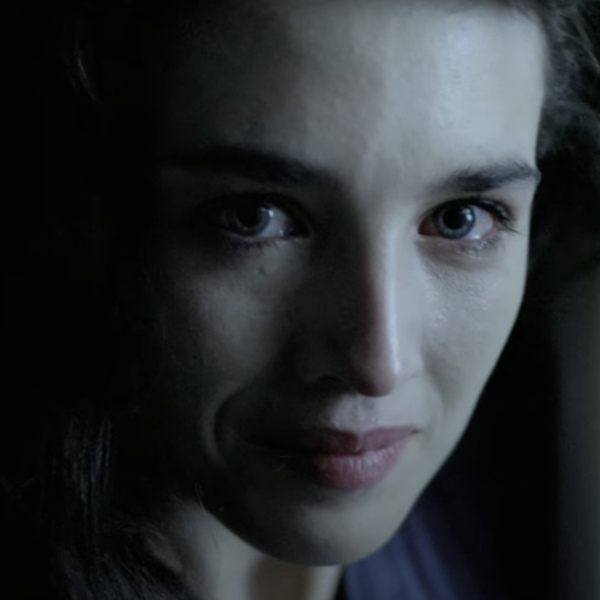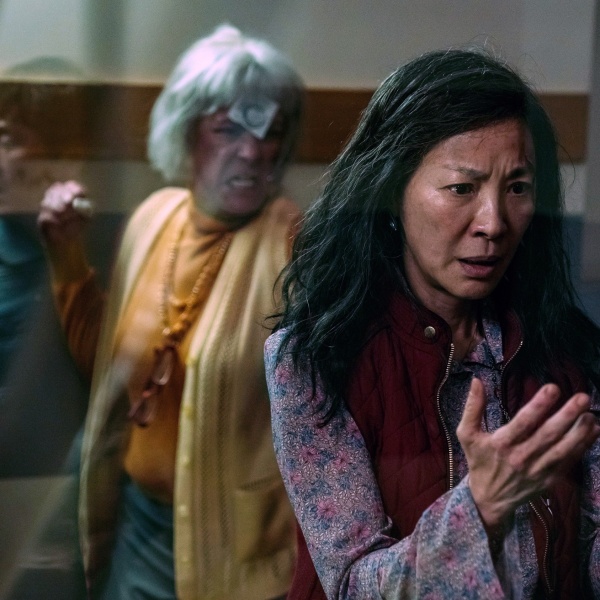Alejandro Monteverde’s last movie, the wildly profitable Christian thriller “Sound of Freedom,” was dogged by accusations that its anti-trafficking hero was himself guilty of fraud and grooming — a tough break for a piece of conspiracy-driven MAGA theology that purported to shine a light on the secret cabal of sex criminals who are hiding in plain sight. Monteverde presumably had no way of knowing that Tim Ballard would become the target of a criminal investigation and get ousted from the very organization that “Sound of Freedom” exists to valorize (the film was shot in the summer of 2018, five years before its eventual release and the lawsuits that followed), but his follow-up feature — shot in 2021 — seems designed to avoid any hint of a similar controversy.
Mother Frances Xavier Cabrini may not have been as pure and perfect a soul as Monteverde’s biopic imagines she was, but the director can rest easy in the knowledge that his newest subject is a literal saint. At this point, more than a century after Cabrini’s death, it’s safe to assume that a “Sexual misconduct allegations” section probably isn’t going to be added to her Wikipedia page anytime soon (current headings include “Missionary Sisters of the Sacred Heart of Jesus,” “Veneration,” and “Shrines”).
So “Cabrini” has that going for it, at least, and the pay it forward scheme that Angel Studios uses to juice the movie’s box office grosses — the secret to its “Sound of Freedom” success — won’t feel like so much of a QAnon pledge drive this time. Here’s hoping Monteverde is able to take some comfort in that, because the virtue inherent to his latest film is just about the only virtue it’s got. Such is the crisis facing a “faith-based” cinema that has struggled to find the sweet spot between Joel Osteen and Infowars: People are sinners, but saints are boring as hell.
A stodgy, histrionic, and impossibly dull biopic that drags on for more than 140 minutes despite being thinner than a stained glass window, “Cabrini” tells the true but coma-inducing story of a woman who refused to take “no” for an answer — even when that answer came directly from the Pope. In theory, that sounds like a solid foundation for a historical drama. In practice, it feels like what might happen if you asked an AI to render “nevertheless, she persisted” in the style of “The Godfather Part II.” Its dialogue is a stale mess of empty slogans in search of a character to support them, its cinematography smothers turn of the century New York under a mustard cloud of digital sepia, and its structure — credited to both Monteverde and screenwriter Rod Barr — is so absent a convincing shape that it might as well be a person with three arms or a t-shirt that only has sleeves.
We meet the future saint when she was still just Maria Francesca Cabrini, a thirtysomething Italian nun played by an inflexibly stoic Cristiana Dell’Anna. The year is 1887, and Cabrini won’t stop spamming the Vatican with requests to let her establish a mission in China. Eventually summoned to Rome by a cardinal who begs to let him unsubscribe from her mailing list (“stay where you belong, mother”), Cabrini insists on speaking to his manager, which is how she winds up sitting across from Pope Leo XIII (Giancarlo Giannini!). Impressed by the undaunted nun, the Pope permits her to become the first woman to oversee an order overseas, albeit with two major caveats: She will go to California, not China, and will do so with the knowledge that the Church may never allow women a second chance if she fails.
Rebel that she is, Cabrini decides to build her “empire of hope” in Manhattan instead. That’s where most of her fellow Italian immigrants arrive in America, and also where they face the most discrimination. Cabrini doesn’t know the half of it: Most of the Italians she meets in this movie can’t walk 10 feet without being spat on by a cop or worse, and the film’s tone-setting prologue follows a young boy as he pushes his dying mother around the streets in a cart, futilely searching for a hospital that might treat foreigners like them.
Seldom has an island been in such desperate need of an orphanage, but creating one will be a tall order in a town whose mayor is a cigar-chewing Batman villain who sees every dead immigrant as a personal accomplishment (John Lithgow plays the fictional Mayor Gould, the outspoken liberal actor clearly enjoying his chance to play a caricature of our modern-day villains). Cabrini might have more luck with the softer-than-he-seems Archbishop Corrigan (David Morse, always capable of divining texture from even the flattest of roles), but he only permits her to solicit money from the same penniless community she’s trying to save.
And yet, despite all of that external discrimination, Cabrini’s biggest obstacle might be her own body. Born two months early and told as a child that she would be bedridden for her entire life, Cabrini has dedicated herself to proving men wrong ever since. She comes to America with a cough so bad that a kindly doctor tells her that she only has two or three years left to live, and that anything more would take a miracle, but “it would take a miracle” is faith-based cinema speak for “this is 100% what’s going to happen,” and so it’s no surprise that she still hasn’t succumbed to some old-timey sickness by the end of this movie (spoiler alert: Cabrini died of malaria at the age of 67 while wrapping Christmas presents for local children at a Chicago hospital, because saints gonna saint right up to the end).
Nothing else stands much chance of slowing her down, which might explain why this epic drama barely has enough conflict to sustain a “Family Circus” cartoon. Time and again, Cabrini is confronted with a poorly defined challenge to her mission; time and again, she responds to it by staring into the middle distance with a clenched jaw and spouting jargon like “The world is too small for what I intend to do.”

As if struggle would be unbecoming of a future saint, Monteverde’s biopic sands down every hurdle until it barely registers on the screen (this isn’t a movie where nothing happens, but it sure feels that way), and even the most basic tenets of Cabrini’s goal become as hard to understand as the threats levied against it. One minute she’s rescuing strays from the sewers underneath Five Points, and the next she’s digging wells for the Sacred Heart Orphan Asylum she founds in the wilds of West Park. “I shall be buried here,” Cabrini declares to the camera, that awkwardly prescient line arriving at the midpoint of a movie so long and empty that I feared it might force me to watch her get interred in real-time.
Rather than sully its heroine with any tension of her own, Barr’s script offloads most of the drama to the film’s disposable supporting cast, who include a sex worker with a heart of gold (the winning Romana Maggiora Vergano) and a street urchin who finds a loaded gun he isn’t afraid to use. These people have their own troubles, but Cabrini is happy to float in the air just above them, her black frock always an inch or two above the ground as if suspended by the unwavering golden wail of Gene Back’s orchestral score.
Other characters question Cabrini’s pathological dedication (even the Pope cautions that he can’t tell where Cabrini’s faith ends and her ambition begins), but there’s never so much as a chip in the religious sister’s godly veneer; she simply appears where she’s needed, ignores the men who tell her to sit down, and does what’s necessary to serve a purpose so poorly fleshed out by this film that it starts to feel like a casualty of her own perseverance. “Cabrini” offers a portrait of its namesake that’s as handsome and sterile as the world it creates around her, and while I wasn’t expecting the guy who made “Sound of Freedom” to make a saint movie as subversive as “Simon of the Desert” or “The Gospel According to Matthew,” the stainless inertia of Monteverde’s biopic can’t help but severely dilute the potency of Cabrini’s humanistic message.
It’s as if “Cabrini” is trying to separate the Christian ideals of the saint’s teachings from the political realities of putting them into practice; as if it’s trying to flatter the moral principles of its conservative audience without pushing that crowd to embody them. Just scan the QR code in the credits, pay a few movie tickets forward, and let the hard work of solving anti-immigrant discrimination become somebody else’s problem. “We can serve our weakness,” Cabrini is told, “or we can serve our purpose.” Cabrini’s willingness to choose one over the other is why she eventually became a saint. Monteverde’s refusal to make his audience do the same is why he’s become Angel Studios signature auteur.
Grade: C-
Angel Studios will release “Cabrini” in theaters on Friday, March 8.






